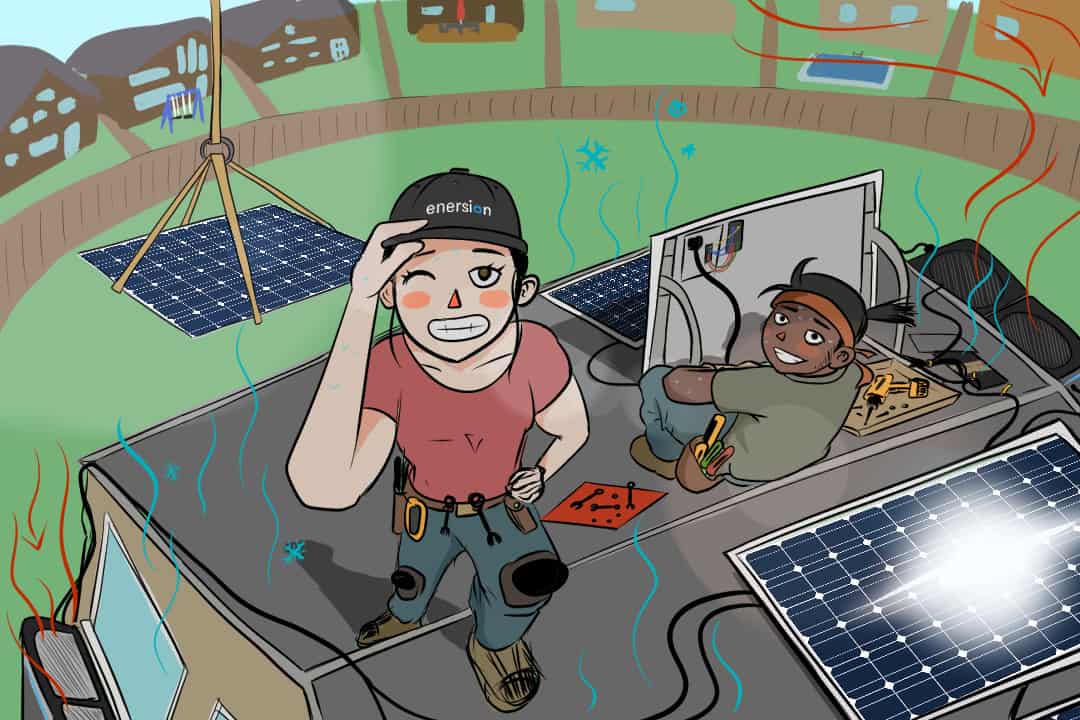November is almost here and while your home will soon need warming, the climate needs cooling.
Unfortunately, these two facts are at odds with one another. With home heating costs contributing to 40 percent of all energy-related carbon dioxide emissions worldwide, the impact of residential temperature control is becoming increasingly concerning. Luckily, a new generation of U of T startups that want to enable housewarming without global warming is here.
Energy and conversion
Enersion is a U of T startup co-founded in 2016 by Hanif Montazeri, a U of T alum and adjunct professor in the Department of Mechanical and Industrial Engineering, who now oversees Enersion’s developments as CEO.
Montazeri and his team aim to accelerate the adoption of clean and efficient decentralized energy through their green Tri-Generation technology. Enersion developed a system that converts solar energy into cooling, heating, and electricity — all combined into one product called Energy Cubed.
Enersion claims to revolutionize heating and cooling with its technology’s ability to use solar panels to transfer solar electricity to the Energy Cubed unit. The unit retains heat from the sun that would otherwise be wasted by solar panels, utilizing it instead to heat water. Panels turn sunlight into cooling and domestic heat through nanoporous materials that enable adsorption — a process by which water vapour evaporates along the materials’ large surface area.
A cool solution to global warming
“It is essential to replace the current technology with a solution that is sustainable, does not create a burden on energy resources and does not use refrigerants that leak into the atmosphere,” Montazeri said in an interview with the Toronto Star. “Enersion’s technology truly provides the cleanest and most efficient way to harness solar radiation.”
Enersion’s environmental efforts earned them the Solar Impulse Efficient Solution Label in June of 2021. The Label, awarded by the Solar Impulse Foundation, which awards clean and profitable solutions. Enersion boasts its innovative use of water as a refrigerant, which allows avoiding the use of atmosphere-polluting chemicals— enabling cooling without the use of electricity and with zero emissions.
In an interview with Global Affairs Canada, Montazeri mentioned that about 10 per cent of global greenhouse gas emissions are caused by refrigerators and air conditioners. He said that, as the world gets hotter, increasing the use of cooling technologies will accelerate global warming even more. According to him, Enersion helps limit this problem: “Our technology… doesn’t use electricity; it uses waste heat, a byproduct of electricity generation.”
True blue entrepreneurs
Enersion began as a U of T startup. The company took advantage of resources offered by the Faculty of Arts and Science’s Centre for Entrepreneurship. The Centre for Entrepreneurship is one of U of T Entrepreneurship’s twelve accelerators that cumulatively created over 600 companies.
The Centre’s primary offering is its Venture Mentoring Service (VMS), which provides a curated selection of mentors to assist in the creation and growth of startups. The VMS is available to U of T students, alumni, faculty, and staff at UTSG.
The Centre for Entrepreneurship also offers a number of coworking spaces for startup founders. Among these will soon be U of T’s Schwartz Reisman Innovation Campus, which will be Canada’s largest university-based innovation node and is slated to open in 2023.


